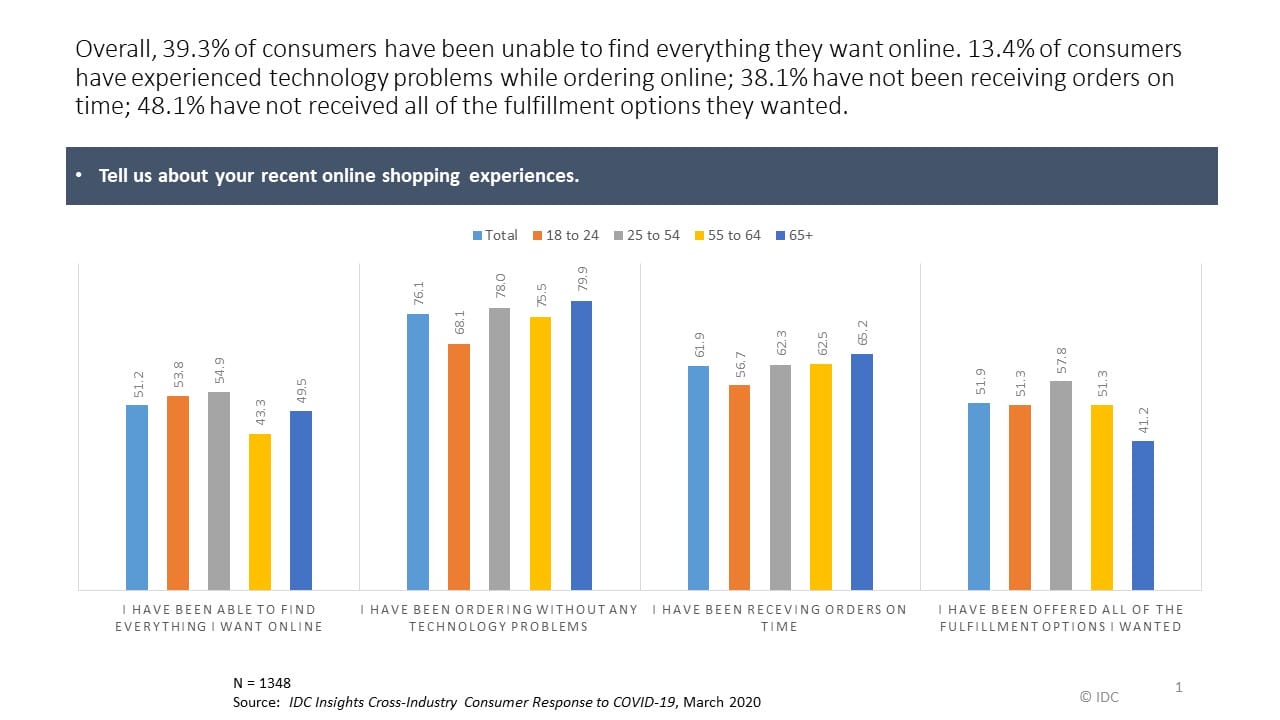Is Your Supply Chain Ready for Black Friday? Analysts Offer Seasonal Insights

September 4, 2020
Black Friday is a big deal — make it or break it for many retailers and suppliers. However, what used to be a brick-and-mortar day of glory has become another online merchants’ coup. According to an IDC report titled “Fighting the Rising Costs of eCommerce with Optimized Shipping and Fulfillment,” while brick-and-mortar sales were down 1.6% on Black Friday of 2019, online sales hit an all-time high of $7.4 billion, up 43% over the previous year.
The acceleration of eCommerce sales this year, in part caused by the COVID-19 pandemic, indicates that this Black Friday may be even more different from years past. To help suppliers and retailers prepare, we spoke with Jordan K. Speer, Research Manager, Global Supply Chain at IDC. This is what we learned.
Combine In-Store and Online Experiences
For physical stores, eCommerce platforms and tools have become vital to attract foot traffic, some in the store — and some outside of it. “Retailers should really try to focus on the merging of physical and digital this season in terms of driving people to the store,” said Ms. Speer. “Curbside has become as important as a store isle — shoppers who are not comfortable stepping inside the store should be able to pick their items at the front. This satisfies consumer demand for quick, contactless retrieval of their orders while also eliminating the costs of shipping.”
Make Sure You’re Ready for Order Spikes
Coping with the holiday sales surge is another supply chain challenge. “I think we’re going to see some major supply and demand issues, as well as uncertainties,” notes Ms. Speer.
According to the latest IDC findings, key concerns for retailers and suppliers are supply chain visibility, flawless fulfilment and timely delivery. While growth in sales is good news, the growth in ecommerce comes with high costs to retailers, and brands and manufacturers too, who are often put in the service of shipping directly to the end consumer, notes the IDC report. Free shipping cuts into profits significantly as do the “hidden” costs of shipping, such as the labor to package product and the cost of the packaging itself.
“Retailers already had enough troubles last year, this year the pressure is even higher,” says Ms. Speer. Luckily, integrated technology can help. With features like advanced automation, rate shopping, and analytics, cloud-based solutions like TrueCommerce’s solution can help businesses manage Black Friday spikes with ease.
Use Automation to Reduce Delays and Errors
Most efficient supply chains are essentially multi-enterprise business networks in which a multitude of companies work together to produce and receive and sell products and supplies. There is a huge number of variables both on the customer-facing side and on the backend.
However, despite rapidly growing sophistication, many processes are still manual. “We talk a lot about cutting-edge technologies, but the truth is that, depending on the company, many crucial tasks are still Excel-spreadsheet driven,” says Ms. Speer. “That takes too much time away from other important tasks and eats into profitability.”
This outdated approach creates significant problems, especially in rush times such as Black Friday. According to findings from the IDC Insights Cross-Industry Consumer Response to COVID-19 (IDC, How Will Consumer Shopping Habits Change in the Wake of COVID-19?, Doc # US46204120, April 2020), 39.3% of consumers have been unable to find everything they want online; 13.4% of consumers have experienced technology problems while ordering online; 38.1% have not been receiving orders on time; and 48.1% have not received all of the fulfillment options they wanted.
Automation is the key for smooth functioning of such a complex ecosystem. “It is humanly impossible to manage the number of daily ‘events’ that must happen across the supply chain well without eliminating error-prone and highly manual processes and replacing them with automated systems,” explains Ms. Speer.
Forward-looking organisations have already been investing in their infrastructure. “In some cases, they already had the technology and plans for full deployment for processes such as curbside, BOPIS and also fulfill-from-store,” says Ms. Speer. “But their plans were often a year out. When the pandemic hit, they had to pivot quickly.”
Consider Cloud-Based Solutions
Businesses globally have realised the potential for applying cloud-based solutions into their supply chain strategies and activities to increase proficiency and profitability. In addition to offering greater flexibility in order processing, cloud-based solutions are more easily managed remotely, and can enable businesses to minimise their back-office staffing needs.
However, transitioning to the cloud can be a multi-faceted process. “Some organisations park their marketing or Point-of-Sale systems in the cloud, but their backend systems – less so,” says Ms. Speer. “For real agility you need a start-to-finish cloud platform.”
To cope with Black Friday challenges, brands need a cloud-based solution that offers automated information flow across the whole supply chain — from a distribution center to the end customer. “Many legacy systems just don’t have this capability; organisations really need the cloud power to support the kind of volumes that holidays ― especially those with pandemics layered atop — can bring,” says Ms. Speer.
Some companies are hesitant to finalise the supply chain transition to the cloud due to Covid-19 financial hardship. Analysts warn this is not the best anti-crisis business decision. “It’s just not feasible, cloud really has to come into play,” says Ms. Speer. Rather, now is the time to invest in the technology, the way companies like Slack, Square, and Groupon did after the 2008 crisis — a move which has turned them into some of the most successful brands more than a decade later.
Black Friday-proven End-to-end Supply Chain Business Networks
Black Friday supply chain challenges are many. When gearing up their cloud infrastructure for the big day, organisations should consider solutions that can support their omnichannel operations using one, unified platform.
TrueCommerce’s Unified Commerce offerring is one such solution. It not only offers key supply chain pillars including EDI, Inventory Management and Digital Commerce, but also an array of add-ons, such as Product Information Management, Drop Shipping, Marketplace Integration, Cartonization and many others. In addition, it guarantees high availability and resilience when orders and shipments are surging, so companies can execute on their Black Friday goals with confidence.
So, is your organisation ready for Black Friday? If you have questions on how to make the most of the year’s largest retail event, contact a specialist at TrueCommerce to see how we can help.
About the Author: Yegor Kuznetsov is a former international news agency editor and a marketing communications veteran who loves telling customer success stories. Over the last 20 years, he has been working for an array of dynamic technology companies, most recently with TrueCommerce, a global provider of trading partner connectivity, integration and unified commerce solutions.
Share this post:
Stay ahead of the competition
Get expert supply chain insights delivered directly to your inbox weekly.
